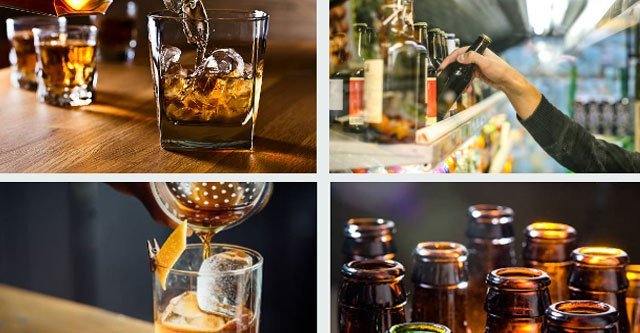Last Updated on June 6, 2021 by Dr Sharon Baisil MD
Diabetes is an increasing problem of the day. It can be controlled and even reversed with the right decisions, health, and lifestyle choices recommended.
The disturbances in insulin production and functioning in the body lead to imbalanced blood sugar levels. This, in turn, leads to the diagnosis of the chronic ailment of diabetes.
But there are several habits one can give up and several more that one can include ensuring safer and better overall health. Well, we will have a look at one such measure today and learn about its effects.
We will be going through:
- Is alcohol safe for diabetes?
- What are its effects?
- Can quitting alcohol reverse diabetes?
- What are the benefits of quitting alcohol for diabetics?
And so on.
Today’s topic is an important one to discuss. Alcohol consumption is a common habit, and it can have different effects on the body and its functioning, especially on individuals with blood sugar issues.
Make sure you stay here till the end of today’s article to learn about the causes and effects that alcohol can cause on the body. We will help you to make a better choice and put your health and well-being forward.
Let us get started by answering one of the most crucial questions that revolve in the minds of diabetic patients.
Is alcohol safe for diabetes?

To get to the root of this answer, we have to know the root of alcohol, that is, its ingredients. But to be straight, alcohol in itself is not very harmful. The added sugar in alcoholic drinks makes it harmful for the body and its blood sugar levels and eventual functions.
There are certain limits to drinking alcohol that diabetic patients can follow according to their blood sugar levels and health conditions. But it is very necessary to pay attention to the sugar content in these drinks, as they are the major reasons that can influence your health.
The effects of any alcoholic drink depend on the quantity of sugar in it and the individual’s blood sugar levels. The amount of sugar varies from variety to variety of alcoholic drinks.
Diabetic patients can therefore consume alcohol in regulated amounts and with proper prior knowledge about the kind of drink and its impacts.
The liver is one of the foremost crucial organs that are affected due to the increased consumption of alcohol. The liver is a primarily important organ involved in the release and absorption of sugars in the body. Thus, it has a direct part to play when it comes to diabetic patients and their health.
Thus, alcohol can be harmful to the body if not handled properly and with complete knowledge.
Let us know more about the other ways in which it can be harmful to the body.
How is Alcohol risky for diabetics?

So you already know that alcohol for diabetics is not a direct yes; it is rather an answer that requires thought and comes with conditions. Drinking alcoholic drinks can have several indirect impacts and risks on health.
The sugar in the alcohol is the main reason why alcohol can be problematic to anyone with diabetes.
Well, are you wondering …?
- How can it be harmful?
- What are the effects it can have?
- How will it affect my body?
Let us delve into the reasoning side of it and answer these questions.
- Sugar added to alcoholic drinks may lead to a rise in the overall carbohydrates and calories of the drink.
Alcohol is low in calories and carbs and would not have any harmful effects on diabetic bodies. But when used to make drinks and beverages, it is mixed with sugars, artificial flavors, sweeteners, and other chemicals that can lead to blood glucose spiking.
- Forms of alcohols that are dry and more concentrated are lower in sugars and calories. But its overuse may have other harmful consequences.
Alcohol resists the conversion of proteins into glucose. Thus, it can lead to a drop in blood sugar levels.
- Sugar and alcohol are a deadly combination for hypoglycemic diabetic patients. On consumption of alcohol, the sugar in it is released in the body and rises in the blood glucose levels.
The effect of alcohol is felt later in the body. Alcohol is responsible for eventually lowering the sugar beyond normal levels.
This can lead to severe hypoglycemic effects on the blood sugar levels, which are very dangerous for the body.
If alcohol is consumed at night, before bed, with a considerable amount of time after dinner, it can severely affect the body’s glucose amounts.
The nightly drop in blood glucose due to alcohol consumption can threaten the patient’s health. The results may be almost fatal and hard to recover from even. It is very important to keep these conditions in mind.
- Mixing soft drinks with your alcohol servings can also be dangerous. Sodas, soft drinks, syrups, etc., also have excess sugar, and hence, they increase the number of total carbs and calories in the body.
These can also be reasons for weight gain as carbonated and sugary drinks lead to excessive body weight.
- If your blood sugar levels fluctuate highly, it is a graver problem to drink alcohol. As we mentioned in the previous points, the different effects of sugar and alcohol may hinder the stability of blood glucose.
Consumption of alcohol can lead to either high or even low blood sugars. The effects cannot be predicted all the time.
This can hamper your other efforts at diabetes management and blood sugar control.
- Too much alcohol can lead to heightened issues of insulin resistance in the body. Insulin inactivity and improper secretions are among the major reasons underlying diabetes.
It can be worsened if alcohol is not taken in regulated amounts.
These are among the few reasons that can lead to many disabilities and severing of existing conditions. Thus, it is necessary to take steps accordingly.
So well, is quitting alcohol a choice? Is it better for the body? Does it have to treat and curing qualities?
Let us find out!
Can quitting Alcohol reverse diabetes?

According to all that we deduced in the previous sub-sections, you can conclude that quitting alcohol is a choice for a better and maintained diabetic lifestyle.
But wait! There is a catch to it. It is not so direct of an answer.
Experiments and studies have proved that periods of alcohol abstinence improve diabetic blood sugar levels and lessen the same risks.
On the other hand, some researchers even say that moderate amounts of alcohol can have good effects on the body. They can even help in diabetes control and improvement if done rightly.
It is advised to control alcohol consumption and bring it to moderate levels. A sudden halt may not be very beneficial. It may be more confusing for the bodily systems.
- It is advised by many to ease the way you drink. If you are a moderate and cautious drinker, you can continue with a change in your quantities to match the safe diabetic quantities.
- If you are a non-drinker, it is no reason to start upon a diabetic diagnosis because of the few good effects it can have.
- Well, on the other side, if you are a heavy drinker of alcohol, it must be stopped and replaced with reduced amounts followed by proper restrictions.
There should be some balance in what you do. Sudden decisions cannot have a good outcome. This is especially true for diabetes as the body becomes more vulnerable to any internal or external changes.
It can be said that quitting alcohol is not directly related to diabetes reversal. Reversing diabetes is not a conclusion that can be determined by altering a single factor.
Diabetes reversal is a goal that can be achieved by proper holistic maintenance of the body. This is a process that requires proper diets, food habits, exercising, efficient routines, and rest schedules as well.
In addition to this, alcohol moderation and resorting to limited amounts can be helpful as well.
So, in other words, although an increase in alcohol can worsen someone’s diabetic consumption. But on the other hand, quitting it suddenly will not have any effect on reversing diabetes.
What can be the impacts of quitting alcohol for diabetics?

As we mentioned earlier, quitting alcohol can have mixed influences on the body. Its impacts are determined on the person’s body depending on their previous reactions and habits.
- Controlling alcohol can reduce the pressure on the liver.
- It can lead to normal blood pressure levels.
- Lowering alcohol intake can improve insulin sensitivity.
- Sudden quitting can cause increased insulin resistance.
- It can also lead to sudden drops in body glucose levels.
Due to these mixed effects, one must find out what suits their bodily needs.
What is a moderate alcohol amount for diabetics?

We kept mentioning a ‘moderate and safe’ amount of alcohol is recommended for diabetics. But what is this amount?
The recommended quantities for different types of alcohol:
- Beer: 12 ounces
Or
- Wine: 5 ounces
Or
- Distilled spirits (Whiskey/Vodka): 1.5 ounces
Always keep in mind that these are limited quantities of serving only.
It is also different for men and women. Women should abide by one serving of the above-mentioned drinks. On the other hand, men can consume two servings with the stated quantities.
References
- https://www.acpjournals.org/doi/abs/10.7326/0003-4819-140-6-200403160-00011
- https://link.springer.com/article/10.1007/s00125-005-1768-5
- https://care.diabetesjournals.org/content/32/11/2123.short
- https://onlinelibrary.wiley.com/doi/abs/10.1002/dmrr.492
- https://jech.bmj.com/content/56/7/542.short
- https://www.sciencedirect.com/science/article/abs/pii/S1043661807000345
- https://care.diabetesjournals.org/content/23/1/18.short
- https://academic.oup.com/aje/article-abstract/128/3/549/80242
- https://www.scielosp.org/article/rpsp/2012.v32n2/151-155/en/





